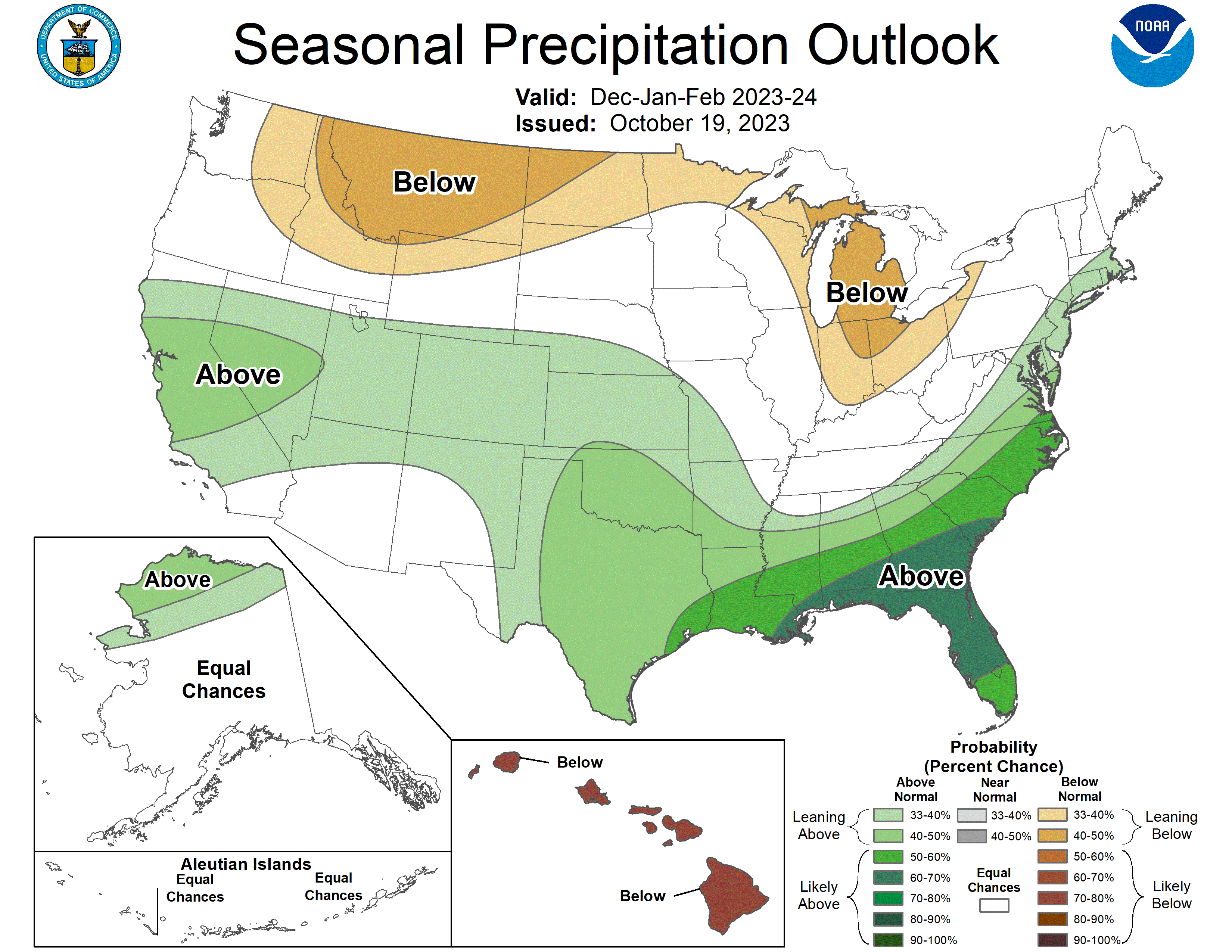Georgia and much of the Southeast have been caught in a dry spell so far this fall. But that is likely to end when winter’s chill arrives, according to a new federal forecast issued this week.
The National Oceanic and Atmospheric Administration’s (NOAA) winter outlook released on Thursday calls for wetter-than-normal conditions in Georgia and most surrounding states from December through February.
Deep South Georgia is most likely to see more moisture than usual this winter, with odds between 60% and 70%. Central and North Georgia are also leaning wet, but with a slightly lower chance.
The main reason why? A strong El Niño climate pattern that persists over the Pacific Ocean.
El Niño is characterized by warmer-than-normal temperatures in the tropical Pacific Ocean, while La Niña is driven by a cooling of those same waters. The phenomena exert a major influence on global weather, but the effects of both are strongest in winter.
El Niño typically brings cooler, wetter conditions than normal to the southern U.S., with higher temperatures and less rain or snow than usual in the northern half of the country.
Right now, most of the Metro Atlanta area is “abnormally dry,” according to the latest U.S. Drought Monitor. The city saw only 1.29 inches of rain in September, less than half of what normally falls during the month. A few pockets of moderate-to-severe drought have even developed in northwest and southwest Georgia.
But the upcoming El Niño winter is “expected to provide drought relief to the southern U.S. during the next few months,” Brad Pugh, an operational drought lead with NOAA’s Climate Prediction Center, said in a statement.
For those wondering whether some of this winter’s precipitation will fall as snow, Pam Knox, an agricultural climatologist at the University of Georgia said, “Don’t get your hopes up.”
“We have to have a very specific set of ingredients: We have to have moisture, at the same time that we have really cold air,” Knox said. “And it’s hard to get both of those things at once in the Southeast.”
Credit: NOAA
Credit: NOAA
The temperature outlook for Georgia this winter is less clear.
While El Niño usually brings cold to the state, NOAA’s forecast says there are equal changes for above- and below-average temperatures. Knox said that’s because the added moisture ushered in by El Niño leads to more cloud cover, which blocks the sun and tends to keep temperatures down during the day. At night however, those same clouds serve as a heat-trapping blanket.
Climate change, meanwhile, is driving average temperatures up throughout the year, with winter warming faster than any other season in Georgia.
“We’ve got those competing factors and we don’t know which one is going to win out yet,” Knox said.
No matter how hot or cold Georgia’s winter ends up being, this much is known: More temperature records are almost certain to be broken in 2023.
After a scorching summer, September brought even more jaw-dropping heat. Global surface temperatures last month were 2.6 degrees above the 20th-century average, the warmest ever observed in NOAA’s 174-year record.
“Not only was it the warmest September on record, it was far and away the most atypically warm month of any in NOAA’s 174 years of climate keeping,” NOAA’s chief scientist Sarah Kapnick said in a statement on Monday. ”To put it another way, September 2023 was warmer than the average July from 2001-2010.”
With more than two months left in the year, the agency already says there is a greater than 99% chance that 2023 will rank as the hottest year ever recorded.
Georgia’s 2023 may not go down as its hottest year ever, but there is a strong chance it ranks inside the top five. So far, temperatures from January to September have averaged 68.5 degrees — almost 2.5 degrees above the 20th-century norm — the fourth-hottest in the state’s recorded history.
Georgia’s hottest year on record was in 2019, and three of the state’s five warmest years have occurred since 2016.
A note of disclosure
This coverage is supported by a partnership with 1Earth Fund, the Kendeda Fund and Journalism Funding Partners. You can learn more and support our climate reporting by donating at ajc.com/donate/climate/
What to expect this winter
- Wetter than normal weather, especially in South Georgia.
- Drought conditions improve across the region.
- Temperature forecast is unclear, with equal chances for above, below or average conditions.
About the Author
Keep Reading
The Latest
Featured



